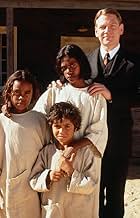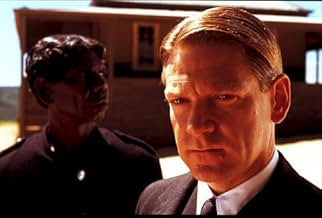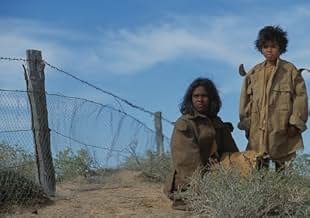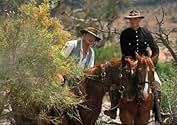IMDb रेटिंग
7.4/10
31 हज़ार
आपकी रेटिंग
1931 में, तीन आदिवासी लड़कियाँ, जिन्हें घरेलू नौकर बनने के लिए प्रशिक्षित करने के लिए जबरन उनके घरों से निकाल दिया गया था, भाग गईं और ऑस्ट्रेलिया के दूरदराज के इलाकों की यात्रा पर निकल गईं।1931 में, तीन आदिवासी लड़कियाँ, जिन्हें घरेलू नौकर बनने के लिए प्रशिक्षित करने के लिए जबरन उनके घरों से निकाल दिया गया था, भाग गईं और ऑस्ट्रेलिया के दूरदराज के इलाकों की यात्रा पर निकल गईं।1931 में, तीन आदिवासी लड़कियाँ, जिन्हें घरेलू नौकर बनने के लिए प्रशिक्षित करने के लिए जबरन उनके घरों से निकाल दिया गया था, भाग गईं और ऑस्ट्रेलिया के दूरदराज के इलाकों की यात्रा पर निकल गईं।
- निर्देशक
- लेखक
- स्टार
- पुरस्कार
- 23 जीत और कुल 25 नामांकन
Lorna Lesley
- Miss Thomas
- (as Lorna Leslie)
फ़ीचर्ड समीक्षाएं
Official policy between 1910 and 1970 in Australia allowed half-caste Aborigine children to be forcibly removed from their families and incarcerated for their own' good in training schools where their were educated to become fitting servants for white families. This institutionalised eugenics, still recent enough to be remembered by its victims, is still a controversial issue in Australia where the PM John Howard refuses to give an official apology. The film has been doing very well in Australia. The story follows three such girls who are forcibly re-located but escape, and follow the rabbit-proof fence' on a 1500 mile journey back home. The title itself seems to echo not only the yellow brick road of the Wizard of Oz (another journey to reclaim one's wholeness) but the fence that was erected to contain animals which is just how the Aborigine children are treated, albeit with the best intentions. The story was adapted from a book by the daughter of the youngest surviving half-cast Aborigine portrayed in the film the actual child actors had mostly never seen a motion picture before let alone acted in one.
Yes we've seen children-on-the-run films, but such glib commentary demeans this true life drama and its implications in real life. This magnificent and tragic story is yet another must-see in re:the little holocausts that have gone on, even in the most "civilized" nations - in this case Australia. What a touching story of three girls, marvelously portrayed by unknown young actresses, who escape from a horrific government policy, initiated by white supremacist Australia pre-Hitler and Nazi Germany. It is odd to say this is beautifully filmed in the Australian outback... and Kenneth Brannagh, echoing his recent portrayal as Heydrich in "Conspiracy", plays white evil incarnate - a prim bureaucrat diligently doing his government job's mandate - to cleanse Australia of "half breeds" in a most heinous (if not deadly) fashion. It is compelling from beginning to end, and the epilogue is most chilling and bittersweet. Superior and meaningful film making.
8=G=
Few films have garnered so much applause (from critics and public alike) with so little. The plot of "Rabbit Proof Fence" can be found elsewhere on this website. Suffice it to say it's about three girls walking and walking and walking and walking and....across some of the most visually austere country on the planet; the Aussie outback. There's little story behind the film, zilch for Hollywood tinsel, and a minimal cast of relative unknowns (except for Branagh's small role). It would be easy to make the case that this film is one long boring flick. However, it would also be easy to make the case it is a beautifully filmed story of courage, determination, and the triumph of the human spirit. I would argue the latter. (B+)
"And miles to go before I sleep/ And miles to go before I sleep" -- Robert Frost
Set in Western Australia in 1931, Rabbit-Proof Fence, a new film by Australian director Philip Noyce (The Quiet American, Clear and Present Danger), is a scathing attack on the Australian government's "eugenics" policy toward Aboriginal half-castes. Continuing policies begun by the British, the white government in Australia for six decades forcibly removed all half-caste Aborigines from their families "for their own good" and sent them to government camps where they were raised as servants, converted to Christianity, and eventually assimilated into white society.
Based on the 1996 book, "Follow the Rabbit-Proof Fence" by Doris Pilkington Garimara (Molly Kelly's daughter), the film tells the story of three Aboriginal girls, 14-year old Molly Kelley, her 8-year old sister Daisy, and their 10-year old cousin Gracie. It shows their escape from confinement in a government camp for half-castes and their return home across the vast and lonely Australian Outback. It is a simple story of indomitable courage, told with honest emotion. Abducted by police in 1931 from their families at Jigalong, an Aboriginal settlement on the edge of the Little Sandy Desert in northwest Australia, the three girls are sent to the Moore River Native Settlement near Perth. Here the children must endure wretched conditions. Herded into mass dormitories, they are not allowed to speak their native language, are subject to strict discipline, and, if they break the rules, are put into solitary confinement for 14 days.
Followed by the Aborigine tracker, Moodoo (a great performance from David Gulpilil), the girls make their escape. Using a "rabbit-proof fence" as a navigation tool, they walk 1500 miles across the parched Outback to return to Jigalong. The rabbit-proof fence was a strip of barbed-wire netting that cut across half of the continent and was designed to protect farmer's crops by keeping the rabbits away. The girls walked for months on end often without food or drink, not always sure of the direction they are going, using all their ingenuity and intelligence along the way just to survive. The stunning Australian landscape is magnificently photographed by Christopher Doyle, and a haunting score by Peter Gabriel translates natural sounds of birds, animals, wind and rain into music that adds a mystical feeling to the journey.
The performances by amateur actors Evelyn Sampi, Tianna Sansbury, and Laura Monaghan (who had never seen a film before let alone acted in one) are authentic and heartbreakingly affecting. Though the white officials and police are characterized as smug and unfeeling, they are more like bureaucrats carrying out official policies than true villains. Kenneth Branagh gives a strong but restrained performance as Mr. Neville, the minister in charge of half-castes. Rabbit-Proof Fence is an honest film that avoids sentimentality and lets the courage and natural wisdom of the girls shine through. This is one of the best films I've seen this year and has struck a responsive chord in Australia and all over the world. Hopefully, it will become a vehicle for reconciliation, so that the shame of the "Stolen Generation" can at last be held to account.
Set in Western Australia in 1931, Rabbit-Proof Fence, a new film by Australian director Philip Noyce (The Quiet American, Clear and Present Danger), is a scathing attack on the Australian government's "eugenics" policy toward Aboriginal half-castes. Continuing policies begun by the British, the white government in Australia for six decades forcibly removed all half-caste Aborigines from their families "for their own good" and sent them to government camps where they were raised as servants, converted to Christianity, and eventually assimilated into white society.
Based on the 1996 book, "Follow the Rabbit-Proof Fence" by Doris Pilkington Garimara (Molly Kelly's daughter), the film tells the story of three Aboriginal girls, 14-year old Molly Kelley, her 8-year old sister Daisy, and their 10-year old cousin Gracie. It shows their escape from confinement in a government camp for half-castes and their return home across the vast and lonely Australian Outback. It is a simple story of indomitable courage, told with honest emotion. Abducted by police in 1931 from their families at Jigalong, an Aboriginal settlement on the edge of the Little Sandy Desert in northwest Australia, the three girls are sent to the Moore River Native Settlement near Perth. Here the children must endure wretched conditions. Herded into mass dormitories, they are not allowed to speak their native language, are subject to strict discipline, and, if they break the rules, are put into solitary confinement for 14 days.
Followed by the Aborigine tracker, Moodoo (a great performance from David Gulpilil), the girls make their escape. Using a "rabbit-proof fence" as a navigation tool, they walk 1500 miles across the parched Outback to return to Jigalong. The rabbit-proof fence was a strip of barbed-wire netting that cut across half of the continent and was designed to protect farmer's crops by keeping the rabbits away. The girls walked for months on end often without food or drink, not always sure of the direction they are going, using all their ingenuity and intelligence along the way just to survive. The stunning Australian landscape is magnificently photographed by Christopher Doyle, and a haunting score by Peter Gabriel translates natural sounds of birds, animals, wind and rain into music that adds a mystical feeling to the journey.
The performances by amateur actors Evelyn Sampi, Tianna Sansbury, and Laura Monaghan (who had never seen a film before let alone acted in one) are authentic and heartbreakingly affecting. Though the white officials and police are characterized as smug and unfeeling, they are more like bureaucrats carrying out official policies than true villains. Kenneth Branagh gives a strong but restrained performance as Mr. Neville, the minister in charge of half-castes. Rabbit-Proof Fence is an honest film that avoids sentimentality and lets the courage and natural wisdom of the girls shine through. This is one of the best films I've seen this year and has struck a responsive chord in Australia and all over the world. Hopefully, it will become a vehicle for reconciliation, so that the shame of the "Stolen Generation" can at last be held to account.
I've seen several movies recently ("Adaptation," "The Hours," "Bowling for Columbine," "City of God," etc.), and "Rabbit-Proof Fence" is the best of the bunch. It's a simple story, but a very moving one. In particular, the performances by the young leads, the beautiful cinematography, and the wise, uncluttered script made this a strong cinematic experience for me. Kenneth Branagh was convincing as the racial purity zealot who manages the whole forced removal scheme. I also really enjoyed the subtle changes we see in the mysterious character of The Tracker (played with wonderfully restrained power by David Gulpilil), as his dogged pursuit of the girls eventually gives way to a dawning admiration. And to cap it all off, the closing real-life footage and text postscript leaves the audience feeling simultaneously devastated and triumphant. Wow.
क्या आपको पता है
- ट्रिवियाEverlyn Sampi (Molly Craig) ran away twice during filming. In one instance, she was found in a phone booth, trying to buy tickets back to Broome.
- गूफ़The three girls Molly, Gracie and Daisy were not taken by surprise and removed by force from Jigalong. The violent removal scene in the film is entirely fictional. The girls' mothers were informed beforehand they were to travel with Constable Riggs and, without any protest, they acquiesced in the decision. The girls left Jigalong on horseback, not locked in a motor car.
- भाव
Daisy Kadibill: [after Molly lifts Daisy up to a bird's nest to gather some eggs to eat] Three of them!
Molly Craig: Perfect. One for you, one for me, and one for both of us!
- क्रेज़ी क्रेडिटThe painting songs sung by the Walpiri, Amatjere and Wangajunka women were not sacred songs, but were songs able to be performed in public.
- कनेक्शनEdited from A Steam Train Passes (1974)
- साउंडट्रैकNgankarrparni
(Sky Blue Reprise) (2002)
Written by Peter Gabriel
Featured by The Blind Boys of Alabama, Myarn Lawford (as Myarn) and Ningali Lawford
टॉप पसंद
रेटिंग देने के लिए साइन-इन करें और वैयक्तिकृत सुझावों के लिए वॉचलिस्ट करें
- How long is Rabbit-Proof Fence?Alexa द्वारा संचालित
विवरण
- रिलीज़ की तारीख़
- कंट्री ऑफ़ ओरिजिन
- आधिकारिक साइट
- भाषाएं
- इस रूप में भी जाना जाता है
- Rabbit Proof Fence
- फ़िल्माने की जगहें
- उत्पादन कंपनियां
- IMDbPro पर और कंपनी क्रेडिट देखें
बॉक्स ऑफ़िस
- बजट
- $60,00,000(अनुमानित)
- US और कनाडा में सकल
- $61,99,600
- US और कनाडा में पहले सप्ताह में कुल कमाई
- $88,352
- 1 दिस॰ 2002
- दुनिया भर में सकल
- $1,62,20,968
- चलने की अवधि
- 1 घं 34 मि(94 min)
- रंग
- ध्वनि मिश्रण
- पक्ष अनुपात
- 2.35 : 1
इस पेज में योगदान दें
किसी बदलाव का सुझाव दें या अनुपलब्ध कॉन्टेंट जोड़ें







































